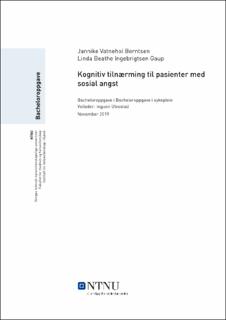| dc.contributor.advisor | Ulvestad, Ingunn | |
| dc.contributor.author | Berntsen, Jannike Vatnehol | |
| dc.contributor.author | Gaup, Linda Beathe Ingebrigtsen | |
| dc.date.accessioned | 2020-06-04T16:05:57Z | |
| dc.date.available | 2020-06-04T16:05:57Z | |
| dc.date.issued | 2019 | |
| dc.identifier.uri | https://hdl.handle.net/11250/2656841 | |
| dc.description.abstract | Tittel:
Kognitiv tilnærming til pasienter med sosial angst Dato : 28.11.19
Forfattere:
Jannike Vatnehol Berntsen
Linda Beathe Ingebrigtsen Gaup
Veileder(e): Ingunn Ulvestad
Stikkord/nøkkelord: Sosial angst, sykepleier, kognitiv terapi, kommunikasjon, relasjon
Antall sider: 40 Antall ord: 10 060 Antall vedlegg: 0
Bakgrunn:
Sosial angst er en av de vanligste angstlidelsene i Norge, og omtrent 13% av befolkningen vil kunne få det i løpet av livet. Tidligere forskning viser at kognitiv terapi har god effekt som behandling for pasienter med sosial angst. Videre opplyser forskningen at denne behandlingsformen ikke kun er forbeholdt leger og psykologer.
Hensikt:
Å undersøke hvordan sykepleiere kan benytte kognitiv tilnærming i møte med sosial angst.
Metode:
Litteraturstudie. Databaser som er brukt er PsychInfo. 6 vitenskapelige artikler er inkludert i studien.
Resultat:
For at sykepleierne skal kunne benytte kognitiv tilnærming i møte med pasienter med sosial angst er det flere elementer sykepleiere må beherske. Disse områdene viser seg å være: 1) empati 2) kommunikasjon og relasjon 3) kunnskapsbasert praksis
Konklusjon:
Det er viktig at sykepleieren har grunnleggende empatiske evner, slik at de kan sette seg inn pasientens situasjon. Ved å skape tillit og relasjon med pasienten, kan det bidra til god behandling. Sykepleieren skal hjelpe pasienten til å styrke sin tro på egne evner og oppleve mestring, og vise respekt for pasientens autonomi. Sykepleieren kan trekke inn elementer fra kognitiv terapi i sin kognitive tilnærming. Gjennom å bruke ABC-modellen kan man hjelpe pasienten til å bli bevisstgjort på egen atferd og tankegang, og dermed endre tankemønsteret. Sykepleierens kognitive tilnærming skal bidra til at pasienten er deltakende i behandlingen, og på sikt bruke veiledningen som sykepleieren har gitt. Sykepleieren må få muligheten til å utvikle sine kunnskaper og ferdigheter for å sikre en god klinisk praksis. | |
| dc.description.abstract | Title:
Cognitive approximation to patients with social anxiety disorder
Date : 28.11.19
Authors:
Jannike Vatnehol Berntsen
Linda Beathe Ingebrigtsen Gaup
Supervisor(s) Ingunn Ulvestad
Keywords: Social anxiety disorder, nurse, cognitive therapy, communication, relation
Number of pages: 40 Number of words: 10 060 Number of appendix: 0
Background:
Social anxiety of one of the common anxiety disorders in Norway, about 13% of the population might get it in their lifetime. Previously researches show that cognitive therapy have a good effect as a treatment for people with social anxiety. The research enlighten that the treatment is not only useable for doctors and psychologist.
Aim:
To examine how nurses could use cognitive approximation with people with social anxiety disorder.
Method:
Literature study. The database used in this study is PsychInfo. 6 scientific articles were included in this study.
Results:
In order for nurses to use cognitive approximation with patients, is it some elements nurses have to manage. These areas are: 1) empathy 2) communication and relation 3) evidence-based practice.
Conclusion:
It’s important that nurses have fundamental empathic skills, so they can understand the patients situation. By gaining the patients trust, nurses can improve their relation to the patient and this can contribute to better treatment outcome. The nurses have to help the patients to strengthen their own ablities and to experience a sense of achievement, by showing respect for the patients autonomy. The nurses could pull in elements from cognitive therapy in their cognitive approximation to the patients. By using the ABC-model they can help the patients to be aware of their own behavior and thoughts, and then change their pattern of thoughts. The nurses cognitive approximation can help the patient to participate in the treatment. Later on the patients can use the nurses guidance for selfhelp. To improve evidence-based practice the nurses have to be given the opportunity to develop their knowledge and skills. | |
| dc.language | nob | |
| dc.publisher | NTNU | |
| dc.title | Kognitiv tilnærming til pasienter med sosial angst | |
| dc.type | Bachelor thesis | |
